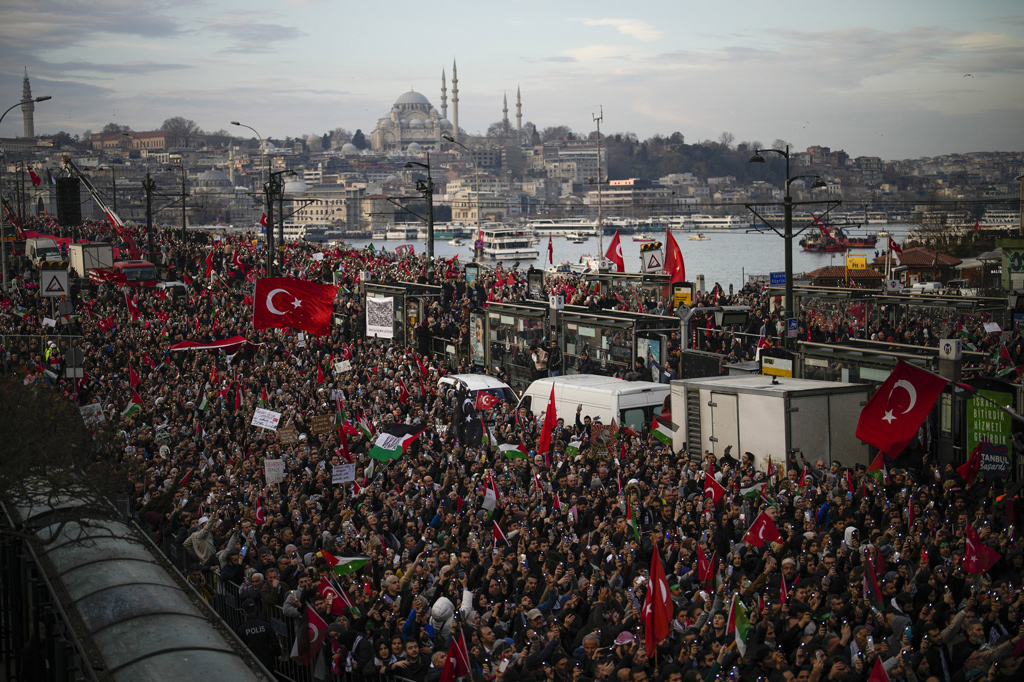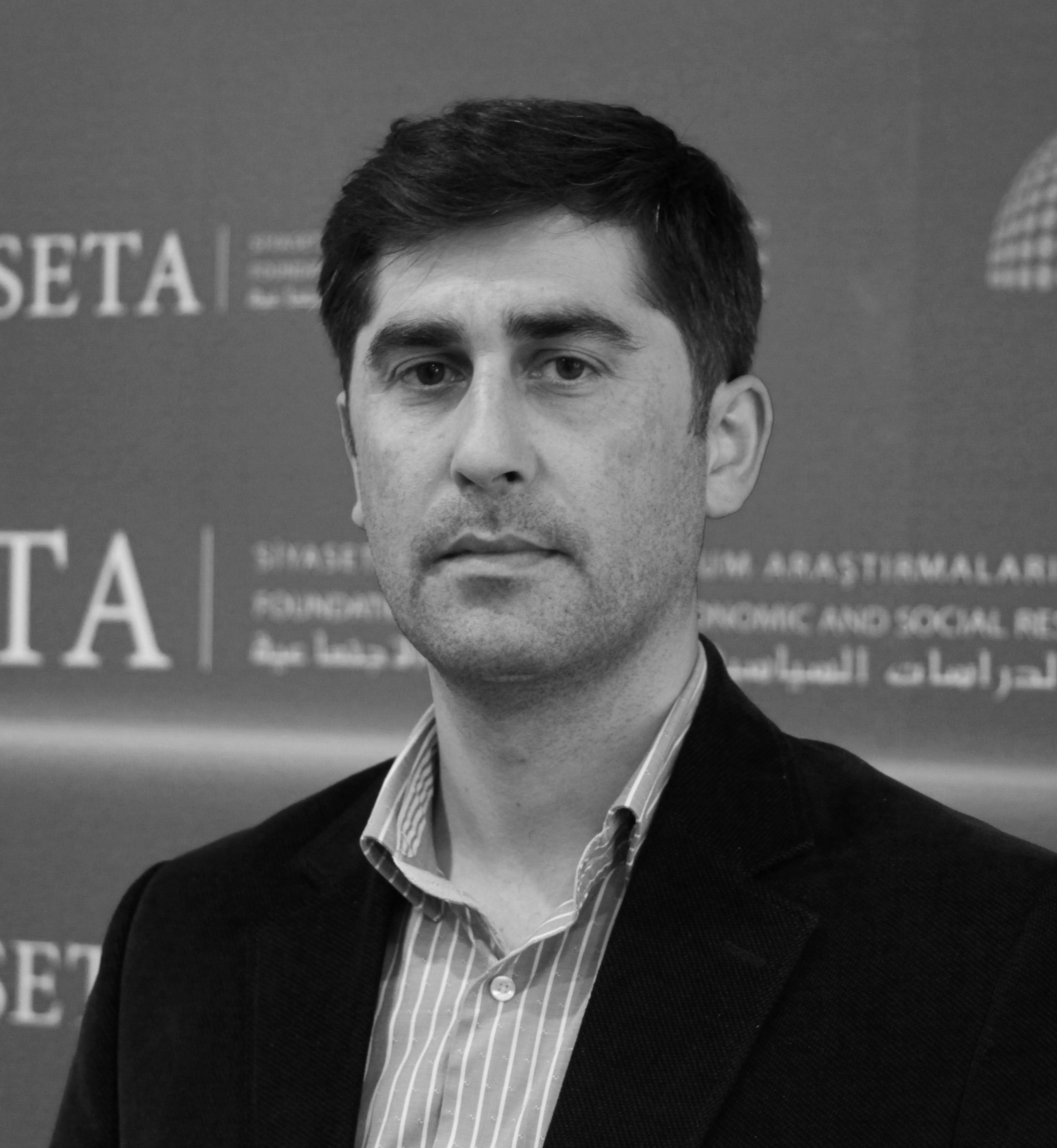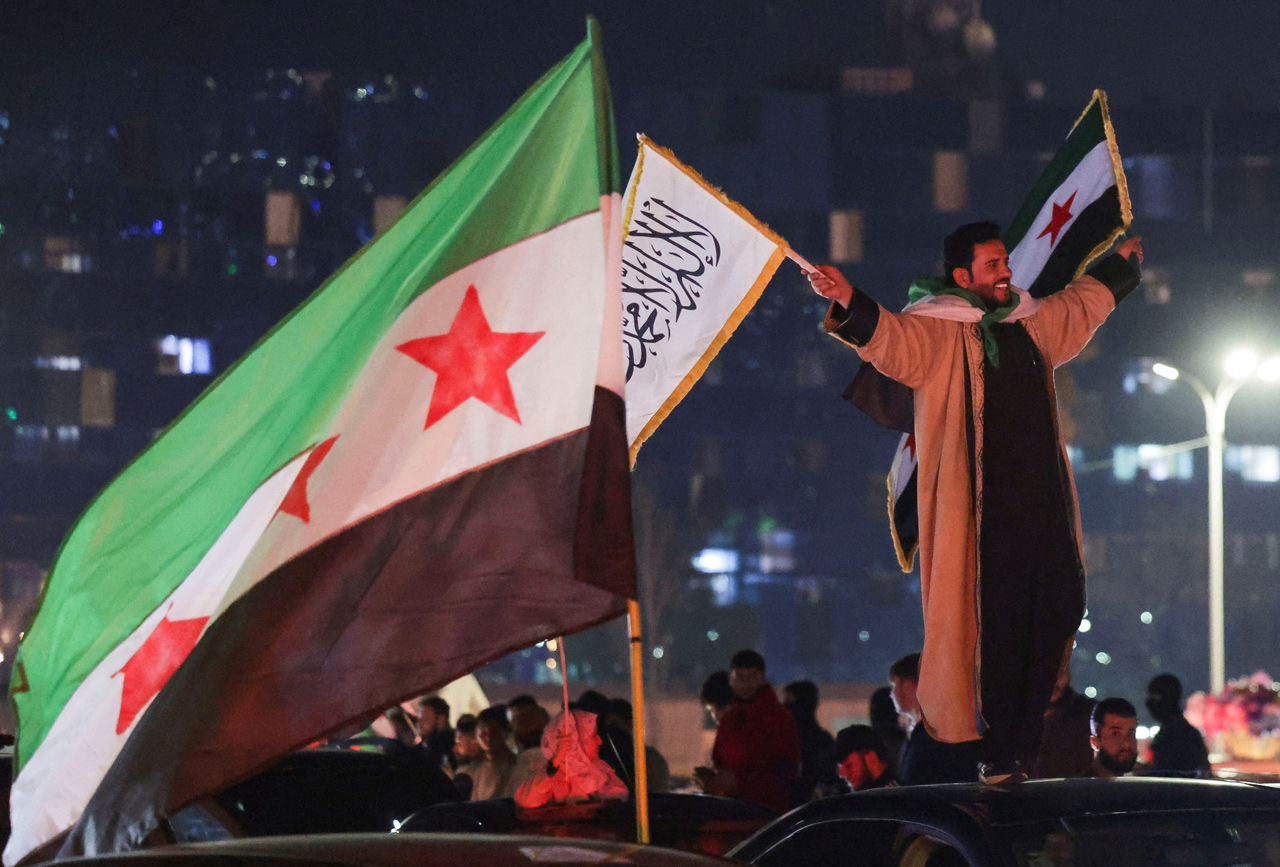Türkiye has been diligently navigating a highly dynamic foreign policy agenda since Oct. 7. The inception of this process, spurred by Hamas’s Operation Aqsa Flood, has compelled Türkiye to undertake a comprehensive reassessment of its foreign policy strategies and plans in the Middle East.
Before Oct. 7, two primary geopolitical narratives influenced the emerging foreign policy vision forged after the 2023 presidential elections. The first narrative centered on a pronounced trend of normalization across a broad geographic swath extending from Yemen to Türkiye. Within this framework, negotiations between Saudi Arabia and the Houthis aimed at resolving the Yemeni conflict, significant strides were made toward a groundbreaking agreement between Saudi Arabia and Israel, and the normalization of relations between Türkiye and Israel was solidified.
The second narrative revolved around the development of a comprehensive foreign policy strategy to position Türkiye for the challenges of a rapidly evolving global competitive landscape and enhance its economic competitiveness. From 2016 to 2021, this strategy sought to transition away from security-driven policies that strained foreign relations toward a more collaborative security approach.
Both strategies faced significant upheaval following the events of Oct. 7, prompting Ankara to pivot its attention toward Gaza and the ensuing regional crisis. This necessitated a thorough reassessment of Türkiye’s foreign policy priorities and strategies. Specifically, the complexities surrounding a cooperative security approach came into sharper focus, yet Ankara remained steadfast in its fundamental foreign policy trajectory.
Diplomatic front
On Oct. 7, Türkiye’s initial response to the Hamas’s attack was a call for restraint. President Erdoğan emphasized that Hamas’s methods were misguided and urged restraint from both sides, foreseeing the potential dire consequences of an escalated Israeli military retaliation. As it became apparent that Israel’s reaction would be robust, Türkiye adopted a cautious approach, refraining from hastily withdrawing its ambassador and directing its criticism toward the Israeli government and Netanyahu specifically.
Following Israel’s military targeting of Gaza in response to the Oct. 7 attacks, Türkiye vigorously engaged in regional and global diplomacy in an effort to restrain Israel and achieve an immediate cease-fire. Despite Türkiye’s active pursuit of coercive diplomacy, aimed at halting the conflict in Gaza, the effectiveness of these efforts was hampered by
the ambiguous positions taken by Western and regional countries. Consequently, Türkiye’s endeavors fell short of halting the war in Gaza.
During this period, Ankara assumed the role of a mediator in an attempt to secure the release of the hostages held by Hamas. However, despite these efforts, the desired outcome was not achieved. Subsequently, the Organisation of Islamic Cooperation (IOC) convened one month after the crisis began, but its diplomatic efforts failed to exert significant pressure on Israel beyond issuing condemnations.
Despite Türkiye’s earnest guarantor proposal at the onset of the crisis, it failed to garner the necessary support from either Western powers or regional countries. Furthermore, Ankara struggled to articulate
a clear stance regarding the operational framework, participating nations, and military obligations of the proposed guarantor mechanism. As the crisis escalated and Israel’s military actions increasingly appeared to be a systematic campaign aimed at dehumanizing Gaza, Türkiye’s position toward Israel grew more stringent.
Initially, Türkiye withdrew its ambassador, suspended energy negotiations and staunchly defended its stance internationally, opposing Western tendencies to label Hamas a terrorist organization. President Erdoğan went a step further by hosting political representatives of Hamas in Istanbul, clarifying Türkiye’s stance on the matter. This move aimed to lay the groundwork for a cease-fire and bolster unity among Palestinian factions.
Despite these measures, Türkiye remained actively engaged in diplomatic efforts, advocating for the preservation of the two-state solution and intensifying pressure on Tel Aviv through trade restrictions. Throughout the process, Ankara steadfastly upheld its position while striving to maintain diplomatic momentum toward a resolution.
Legal front
Türkiye’s most recent action entails the announcement of its intention to get involved in South Africa’s genocide case against Israel at the International Court of Justice (ICJ). Foreign Minister Hakan Fidan declared Türkiye’s decision to join the case filed by South Africa against Israel, with plans to promptly submit the application to the ICJ for intervention. Notably, Nicaragua had previously applied for intervention in support of South Africa on Jan. 23, 2024, followed by Colombia on April 5, 2024.
Türkiye’s decision to get involved in South Africa’s genocide case against Israel was preceded by extensive diplomatic engagement with numerous countries over an extended period. In pursuit of support for this significant decision, Türkiye engaged in comprehensive negotiations with member states during the Organisation of Islamic Cooperation (OIC) Riyadh meeting. During these deliberations, Türkiye secured the support of OIC member states, further solidifying its position in the international arena.
Indeed, there are two main grounds for intervention in a case before the International Court of Justice. The first ground, as outlined in Article 62 of the ICJ Statute, allows a state to request intervention if it believes it has a legal interest that may be affected by the court's decision in the case at hand. This was the basis of Nicaragua's application for intervention.
The second ground, based on Article 63 of the ICJ Statute, involves intervening to address the interpretation of a treaty rather than the specific case being disputed. In this scenario, a third state may seek intervention as it would be impacted by the interpretation of the international convention to which it is a party.
These two avenues provide mechanisms for states to intervene in ICJ cases, either to protect their legal interests directly affected by the case outcome or to influence the interpretation of relevant treaties that have broader implications beyond the specific dispute at hand.
If Türkiye were to seek intervention based on Article 63 of the ICJ Statute, it could argue that the interpretation of the 1948 United Nations Convention on the Prevention and Punishment of Genocide, which underpins South Africa's case, also holds significance for Türkiye as a state party to the convention. By intervening on this basis, Türkiye would aim to actively participate in the proceedings and influence the interpretation of the convention, thus shaping the outcome of the case in a manner aligned with its interests and legal perspectives. If the ICJ accepts Türkiye's request for intervention, it would indeed enable Türkiye to play a proactive role in the proceedings.
Indeed, Türkiye's decision to join in
South Africa's genocide case against Israel marks a significant and assertive stance regarding the Gaza crisis. By bringing the genocide accusation to a legal platform, Türkiye aims to unequivocally clarify its position toward Israel and actively support South Africa's case. This move not only strengthens Türkiye's legal standing in the case but also sends a strong signal regarding its stance on the Gaza crisis.
Furthermore, Türkiye's intervention may inspire other states to also take action, potentially leading to a collective effort aimed at addressing the situation and putting pressure on Israel to halt its actions. In this way, Türkiye's proactive approach in supporting South Africa's case could contribute to diplomatic efforts aimed at resolving the crisis and bringing about a cessation of hostilities.
Indeed, the Gaza war has had significant implications for
Türkiye's foreign policy. Firstly, it has halted or delayed the normalization process between Türkiye and Israel, pushing it to an uncertain future. The escalation of conflict in Gaza has strained relations between the two countries, putting any normalization efforts on hold.
Conversely, the Gaza war has also bolstered Türkiye's influence in regional politics. By taking a strong stance and actively engaging in diplomatic efforts to address the crisis, Türkiye has demonstrated its commitment to regional stability and its willingness to assert itself on the international stage. This increased involvement has enhanced Türkiye's stature and weight in regional affairs, solidifying its position as a key player in the Middle East.
In summary, while the Gaza conflict has
put a pause on Türkiye-Israel normalization, it has also elevated Türkiye's role and influence in regional politics, underscoring its importance as a diplomatic actor in the broader Middle Eastern context.
[Daily Sabah, May 3, 2024]


 Throughout this period, Ankara sought to establish robust regional and global diplomatic channels aimed at applying pressure on Israel. The Contact Group for Gaza spearheaded efforts to mobilize Western capitals, aiming to restrain Israel and garner support for a cease-fire. However, the cease-fire proved short-lived despite these concerted diplomatic endeavors.
Despite Türkiye’s earnest guarantor proposal at the onset of the crisis, it failed to garner the necessary support from either Western powers or regional countries. Furthermore, Ankara struggled to articulate a clear stance regarding the operational framework, participating nations, and military obligations of the proposed guarantor mechanism. As the crisis escalated and Israel’s military actions increasingly appeared to be a systematic campaign aimed at dehumanizing Gaza, Türkiye’s position toward Israel grew more stringent.
Initially, Türkiye withdrew its ambassador, suspended energy negotiations and staunchly defended its stance internationally, opposing Western tendencies to label Hamas a terrorist organization. President Erdoğan went a step further by hosting political representatives of Hamas in Istanbul, clarifying Türkiye’s stance on the matter. This move aimed to lay the groundwork for a cease-fire and bolster unity among Palestinian factions.
Despite these measures, Türkiye remained actively engaged in diplomatic efforts, advocating for the preservation of the two-state solution and intensifying pressure on Tel Aviv through trade restrictions. Throughout the process, Ankara steadfastly upheld its position while striving to maintain diplomatic momentum toward a resolution.
Throughout this period, Ankara sought to establish robust regional and global diplomatic channels aimed at applying pressure on Israel. The Contact Group for Gaza spearheaded efforts to mobilize Western capitals, aiming to restrain Israel and garner support for a cease-fire. However, the cease-fire proved short-lived despite these concerted diplomatic endeavors.
Despite Türkiye’s earnest guarantor proposal at the onset of the crisis, it failed to garner the necessary support from either Western powers or regional countries. Furthermore, Ankara struggled to articulate a clear stance regarding the operational framework, participating nations, and military obligations of the proposed guarantor mechanism. As the crisis escalated and Israel’s military actions increasingly appeared to be a systematic campaign aimed at dehumanizing Gaza, Türkiye’s position toward Israel grew more stringent.
Initially, Türkiye withdrew its ambassador, suspended energy negotiations and staunchly defended its stance internationally, opposing Western tendencies to label Hamas a terrorist organization. President Erdoğan went a step further by hosting political representatives of Hamas in Istanbul, clarifying Türkiye’s stance on the matter. This move aimed to lay the groundwork for a cease-fire and bolster unity among Palestinian factions.
Despite these measures, Türkiye remained actively engaged in diplomatic efforts, advocating for the preservation of the two-state solution and intensifying pressure on Tel Aviv through trade restrictions. Throughout the process, Ankara steadfastly upheld its position while striving to maintain diplomatic momentum toward a resolution.






